EQUITY IN MATH EDUCATION RESEARCH GRANTS (EMERG) PROGRAM SCHOLARS
Daniela Alvarez-Vargas, University of Denver
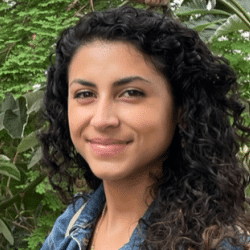
Daniela Alvarez-Vargas was born in Pereira, Colombia and moved to Miami, Florida right before entering Kindergarten. She later completed her bachelor’s degree in psychology with a minor in statistics at Florida International University. Dr. Alvarez-Vargas’ experiences helping raise her beloved younger siblings and her undergraduate research with Dr. Shannon Pruden motivated her to pursue a PhD in Education with a focus on Human Development in Context. Dr. Alvarez-Vargas earned a Doctorate degree in Education at the University of California, Irvine with the guidance of Dr. Drew Bailey. In her doctoral work, Dr. Alvarez-Vargas focused on determining how different research methods could be used to evaluate how well educational programs reduce academic disparities, with the goal of informing policy and practice. She is passionate about developing research approaches and educational tools research to support children’s mathematical development from preschool to secondary education. Dr. Alvarez-Vargas focuses on evaluating, designing, and implementing strengths-based learning opportunities for students who have been historically marginalized in mathematics. She strives to balance participatory co-design approaches and causal inference methods to assess what works and for whom and to reimagine novel learning opportunities for children and their communities. Currently, Dr. Alvarez-Vargas is a postdoctoral fellow at the University of Denver, Marsico Institute for Early Learning working with Drs. Doug Clements and Julie Sarama. In this work she engages directly with families and teachers to build math education equity from the community perspective, and to continuously improve and redesign educational tools that support children’s mathematical identity and knowledge work.
Seeing Math Within: Co-Designing Mathematics Activities with Families and Teachers
Mariana Alvidrez, New Mexico State University
Mariana Alvidrez serves as an assistant professor of STEM education in the School of Teacher Preparation, Administration, and Leadership in the College of Health, Education, and Social Transformation at New Mexico State University. Throughout her professional journey, she has developed her expertise by engaging in various capacities within mathematics education fields on both sides of the U.S.-Mexico border community. Mariana Alvidrez’s research is centrally concerned with inclusion, exclusion, equity, belonging, and justice issues in mathematics education. She is especially interested in examining Latino/a/e students’ experiences in mathematics, which are often shaped by systemic racism and intersecting systems of oppression. More specifically, her previous and still ongoing work has focused on how teachers of mathematics frame students’ errors. She has been exploring how these framings either support or impede students’ learning opportunities, the development of their sense of agency, and the formation of their identities as capable thinkers and doers within the mathematical classroom environment. In addition, Mariana is deeply interested in the development of equitable assessment strategies that effectively support Latina/o/e students who are English Learners to leverage their linguistic repertoires as a fundamental resource in the learning and assessment of mathematical skills.
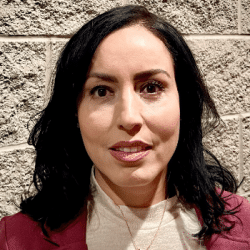
Fostering Critical Consciousness: Transforming Pre- and In-Service Latino/a/e Bilingual Teachers’ Perceptions of Latino/a/e English Learners’ Abilities and the Role of Errors in the Math Classroom through Professional Development on the U.S.-Mexico Border
Susana Beltrán-Grimm, Purdue University
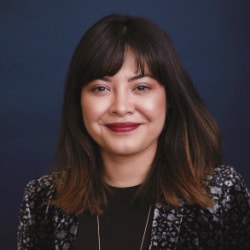
Dr. Susana Beltrán-Grimm is a postdoctoral research associate in the Human Development and Family Science department at Purdue University, focusing on multidisciplinary approaches in developmental science to examine Latine families’ social and cultural contexts. Dr. Beltrán-Grimm holds an Ed.D. in Educational Psychology with a specialization in learning technologies from Pepperdine University. Her research focuses on asset-based approaches to examine the home math environment, explore children’s digital media and tools, identify Latine families’ social and cultural contexts, and center co-design approaches to promote equity in research methods. Dr. Beltrán-Grimm received the Outstanding Dissertation Award from the American Educational Research Association’s (AERA) Latina/o/x Research Issues Group and has been honored with the Society for Research in Child Development (SRCD) Early Career Transdisciplinary Fellowship. Dr. Beltrán-Grimm’s research has thrived both in applied settings, as the Early Learning Director for the PBS Station in Los Angeles, and in academic settings, acknowledging her dedication to advancing translational and transdisciplinary research that is deeply connected to community needs. Dr. Beltrán-Grimm is currently engaged in research in her native Mexico, working with the Indigenous Tsotsil families to explore math practices distinguished by cultural traditions, codes, and linguistic narratives. Dr. Beltrán-Grimm also works as an education consultant with several nonprofit organizations to translate research into effective and enduring evidence-based interventions and resources that are connected to the community and have a practical impact on children and families.
Role of Oral Language in Mathematics Learning: A Study of Bilingual Latine Families and Children
This study will explore the intersection of mathematical language and cultural practices among U.S. Latine families with children in kindergarten. It addresses the gap in mathematics development research, which has primarily focused on the Minority World (westernized countries), neglecting the Majority World (countries with most of the world’s population). The overrepresentation of World Minority participants biases knowledge, hindering generalizability to non-Western contexts (Henrich et al., 2010). Adopting a mixed-method approach within a qualitative framework, the project includes an ethnographic study complemented by the Language Environment Analysis (LENA) system. This approach aims to intricately map and analyze the language environments of Latine parent-child pairs. Central to this research is exploring how culturally specific language practices in bilingual Latine households shape their children’s mathematics learning. It investigates the dynamics of bilingual language use and interaction patterns during math-related activities at home. To achieve a holistic understanding, the study employs ethnographic semi-structured interviews, participant observations, and LENA software, offering a rich, multi-dimensional view of these families’ mathematical language and cultural practices. The expected outcomes include valuable insights into bilingual Latine families’ distinctive language practices and pedagogical strategies. This will enhance our understanding of math learning in diverse cultural contexts and suggest ways to bridge the gap between mainstream and marginalized mathematical knowledge systems.
Salvador Huitzilopochtli, Michigan State University
Salvador Huitzilopochtli is currently a post-doctoral researcher at Michigan State University in the Advancing STEM Education through Participatory and Community-Engaged Research (STEM Ed PaCER) program. He earned his PhD in Education from the University of California at Santa Cruz. Dr. Huitzilopochtli’s dissertation, titled “Multilingual Students’ Arguments in Early Algebra: Writing, Refining, and Revising Through Conferencing,” examined how multilingual students verbally revised mathematical arguments during teacher conferences. His research interests include mathematical argumentative writing and early algebra with a focus on fostering equitable outcomes for all students. Dr. Huitzilopochtli earned master’s degrees in Education from UC Berkeley and UC Santa Cruz and his research is informed by ten years of experience as a middle-school mathematics teacher and teacher–leader in culturally, linguistically, and economically diverse schools in the East Bay Area. His approach to mathematics education emphasizes the roles of language, literacy, and culture in learning.
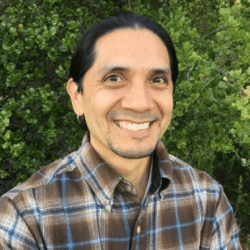
Constructing Arguments Together: Redefining Participation in Mathematical Argument
This study uses the Learning by Observing and Pitching In to Family and Community Endeavors (LOPI) framework to shape teacher professional development (PD) and classroom activities so that middle-grades students hone their mathematical justifying practice while engaging mathematical arguments. Historically, students from underrepresented and minoritized (URM) communities have had less access to robust mathematics education. In particular, Black, Latinx, and Indigenous students have been plagued by racial animus, segregation, deficit framings, and mathematics courses that serve as “gatekeepers.”
This comparative case study uses LOPI to frame the organization and resulting products of a teacher professional development series in which teachers plan and enact classroom activities. LOPI describes how learning activities are organized in heritage Indigenous communities from North America and presumes students have autonomy and agency as they participate in community endeavors by intent observation and pitching in. I will analyze the activities generated by the teachers to examine their alignment with the LOPI facets and interview teachers to understand their beliefs about student participation and agency. I will examine the classroom activities to characterize the participation and arguments students generated in class and then examine how they revise those arguments when given the opportunity using Harel & Sowder’s (1998) proof schemes framework.
This study contributes to mathematics education research in two ways. First, by expanding possibilities for participation in mathematical activity and discussions through classroom reorganization. Secondly, by inviting teachers and students into a world organized with decolonial approaches to shape mathematical activity.
Christopher Leatherwood, University of Pittsburgh

Teacher Training in Error Analysis within Classrooms using an Error PVEST Model
His work seeks to apply an ecological systems lens to study mathematics learning, explicitly within the context of student errors. To examine this topic, Dr. Leatherwood utilizes a mixed methods approach that include multiple surveys, teacher interviews, and direct classroom observations. This methodological approach is necessary because his work seeks to interrogate the complex system created by the interplay within multiple levels of an ecological system (specifically the micro, meso, exo, and macrosystem levels) at a specific moment in time. These moments are defined as error interactions in which a student commit an error, the teacher identifies this error, and an interaction occurrs in which the error is the focus. This specific context is important because students are often vulnerable when they potentially commit an error in a classroom. This vulnerability can influence their perceptions of themselves, their perceptions about others, and their perceptions of the content. In addition, metanarratives exist concerning racial and ethnic identity that contain stigmas and stereotypes associated with being Black and doing mathematics (Martin, 2006). These stigmas and stereotypes can be exacerbated when students commit errors and increase the potential vulnerability students experience during their educational journey.
Nickolaus Alexander Ortiz, Georgia State University
Nickolaus Alexander Ortiz, Nickolaus for short, is a tenure track assistant professor of Mathematics Education in the Department of Middle and Secondary Education at Georgia State University. He is a 2018 graduate of Texas A&M University where he earned his doctorate in Curriculum and Instruction with a focus in Mathematics Education. Following graduate work, Dr. Ortiz served as a post-doctoral research associate at Michigan State University. He is a product of {East} Atlanta, Georgia, where he taught high school mathematics for three years in a public school, and he continues to teach calculus each summer in Atlanta with the UpwardBound Program at Morehouse College. An emerging academic and experienced educator, Dr. Ortiz has been honored as a 2022 recipient of the Ernest D. Morrell Emerging Scholar Award and with the Early Career Publication Award from AERA’s Research in Mathematics Education SIG. His research focuses on how an ontological Blackness is manifested and/or stifled during high-quality mathematics instruction that emphasizes teaching for conceptual understanding, mathematics discourse, and cultural relevance. Specifically, he studies mathematics discourse and Black Language, and is actively theorizing about what it means to create a Black liberatory mathematics education that affirms these linguistic practices and Black people writ large. Last but not least, he is a musician (by hobby) who loves everything from Gladys Knight to OutKast, and one who theorizes the connections between music and mathematics in his approach to culturally relevant mathematics pedagogy.

Let it resound, without bound: The joy and brilliance of Black Language in Mathematics Discourse
This project will devote major energies to planning and producing a documentary focused on the way some Black people (high-school aged youth and beyond) explain their mathematical thinking, processing, and solution strategies, giving an explicit focus to a sociolinguistic analysis guided by Baker-Bell’s description of the features of Black Language (2021). Findings will highlight relevant examples of the syntax, semantics, phonology, and rhetorical features evidenced in participant responses. Analyses will examine participants’ explanations for evidence of procedural or conceptual knowledge of the topics. Ultimately, it is not my intention to show that BL is a mutually unintelligible language, but to show that there is a style, a cadence, a joy and a resistance that is embodied in the familiarity of our linguistic practices, all of which have room in the mathematics space. I intend to show that some of these signifying, proverbial uses, and narrative styles (Lee, 1995) might be captured in the ways the participants explain mathematics concepts. Tangentially, I hope to construct findings that share mathematics educators and practitioners’ positions towards these Black people’s understandings of the topics. Findings will convey whether the dispositions that they have towards BL speakers’ mathematical prowess, as evident in their discussions of the topics, are generally favorable. My findings will help to prepare other teachers to listen to the substance that is in students’ responses, and will help to support them in rethinking the ways that they might dismiss or try to supplant Black youth’s linguistic practices, and towards what end.
Sandra Zuñiga Ruiz, San Jose State University
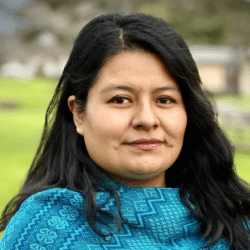
Towards Emancipatory Anti-Racist Mathematics Teaching and Learning
Mallika Scott, California State University Fullerton
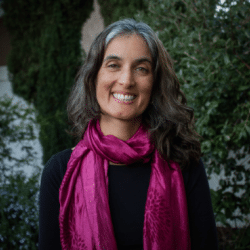
Mallika Scott is an Assistant Professor of Elementary Education at Cal State Fullerton. Before pursuing an academic career, Mallika worked as a classroom teacher and K-8 mathematics instructional coach. Her research focuses on investigating, designing, and supporting robust teacher learning, particularly as teachers navigate the tensions of working toward a vision of just and equitable mathematics teaching that is not yet widely held or practiced in systems of schooling. Drawing on social design-based methodologies, she works in solidarity with educators to explore transformative possibilities for mathematics teaching and learning that honors the dignity of young people. Mallika’s work is shaped by her experiences as a mother of children in public schools and as a classroom teacher trying to transform unjust systems while working within them. She earned her Ph.D. in Learning Sciences and Human Development with a specialization in Mathematics Education from the University of California, Berkeley. Her work has been published in academic and practitioner venues including Cognition and Instruction and Teaching for Excellence and Equity in Mathematics.
Attending to Mathematical Ingenuity to Nourish, Empower, and Sustain Elementary Mathematics Teachers
The current sociopolitical climate presents ongoing tensions and contradictions for teachers who are committed to fostering robust mathematical learning that builds on the resources each child brings to mathematics. Teachers may encounter a variety of emotionally taxing situations, from the continued prevalence of deficit discourse toward children from minoritized communities to recent incursions into public education from school boards seeking to constrain teacher autonomy. This project focuses on the design and study of collaborative forms of support that can nourish, empower, and sustain elementary teachers in their commitments to ambitious and equitable mathematics teaching as they navigate fraught political contexts. In the proposed study, I will work with a group of practicing elementary teachers to co-design supports that help teachers stay connected to the brilliance of children and the joys of mathematics teaching through a focus on human ingenuity. Collaborative supports will be co-constructed with teachers and may include facilitating community math nights that celebrate expansive displays of mathematical ingenuity, working on math tasks together to connect with children in the human experience of mathematical learning, and leading workshops for pre-service and practicing teachers about ambitious and equitable mathematics teaching. This project aims to strengthen the local TK-8 justice-oriented math education community and to contribute to our understandings of how to support teachers in their mathematics teaching practice while also attending to their spirits.
Richard Velasco, The University of Oklahoma
Dr. Richard Velasco is an assistant professor of mathematics education in the Department of Instructional Leadership and Academic Curriculum at the University of Oklahoma. His primary research focuses on rehumanizing mathematics by shifting the power and privilege in mathematics held by dominant groups towards those who have been historically and systemically marginalized. Dr. Velasco’s secondary research areas include STEM teacher advocacy and informal STEM learning spaces. He has published his work in various national and international journals including The Educational Forum, The Electronic Journal for Research in Science and Mathematics Education, and The International Journal of STEM Education. Prior to his role at the University of Oklahoma, Dr. Velasco was recognized for teaching excellence as a secondary math teacher, receiving National Board Certification in Early Adolescent Mathematics from the National Board for Professional Teaching Standards and the Presidential Award for Excellence in Mathematics and Science Teaching bestowed by The White House and The Office of Science and Technology Policy. Before entering higher education, he taught secondary mathematics for twelve years in Guam, where he is originally from, and Washington state. Dr. Velasco earned a dual bachelor’s degree in Mathematics and Secondary Education from the University of Guam, a master’s degree in Curriculum and Instruction from the University of Saint Mary, and a Ph.D. in Curriculum and Instruction with a specialization in STEM Education from Texas Tech University.
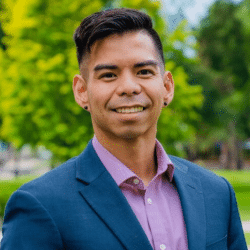
Amplifying Indigenous Micronesian Intelligence for Data Science (MINDS) with Culturally Relevant Data
There has been a concerted effort to enhance K-12 students’ comprehension of data concepts, and with data now integral to society, it is imperative to equip secondary school students with the knowledge and skills to navigate this data-driven era effectively. Despite the goal of “data science for all,” underrepresentation in data science is a pressing concern, with no specific data for Pacific Islanders (PIs). This stark underrepresentation extends to PI communities in Micronesia, depriving the field of valuable insights into island sustainability and Indigenous knowledge systems. The mismatch between curricula in Micronesia’s public schools, rooted in Eurocentric ideologies, and the cultural identities of Micronesian students further hampers their engagement with data science. Using Indigenous methodologies grounded in the CHamoru values of Inafa’maolek, the Indigenous MINDS project aims to address these issues by collaborating with Indigenous and non-Indigenous Micronesian educators and scholars in Guåhan and Saipan. Its primary objectives are to co-develop culturally relevant data science curriculum and pilot secondary-level modules tailored to the unique cultural context of these U.S. territories. By integrating culturally relevant data, the project seeks to enhance student engagement in data science, foster cultural competence in participants, and address social injustices prevalent to the Pacific region. The Indigenous MINDS project further contributes to bridging the gap in data science education, promoting diversity, and offering a culturally sensitive approach to data science for Indigenous Micronesian communities. Through collaboration and culturally relevant data integration, this project endeavors to make data science accessible and meaningful to a broader student population.
Cathery Yeh, The University of Texas at Austin

Searching for Educational Equity Through Critical Socio-Spatial Analysis
Despite a growing focus in mathematics education to critique power, critical mathematics approaches in both elementary education and teacher education settings have rarely attended to the intersections of racism and ableism in mathematics education. Racism and ableism are often thought of as parallel systems of oppression that work separately to perpetuate social hierarchies. This perspective ignores the experiences of disabled students of color, but it also fails to examine racialized ableism – how race is pathologized through ableism to perpetuate systemic racism in mathematics education. The following research question shapes the project design: How do the mathematics counter-stories developed by students and families identify and disrupt ways in which racism and ableism shape learning spaces within and connected to schools? To address the project goal, the project captures the mathematics counter-stories of students of color identified with disabilities and their families through multimedia Education Journey Mapping, using mobile documentary media production with Geographic Information System (GIS), to explore the role of space, race, and ability inside and outside of classrooms and schools.
